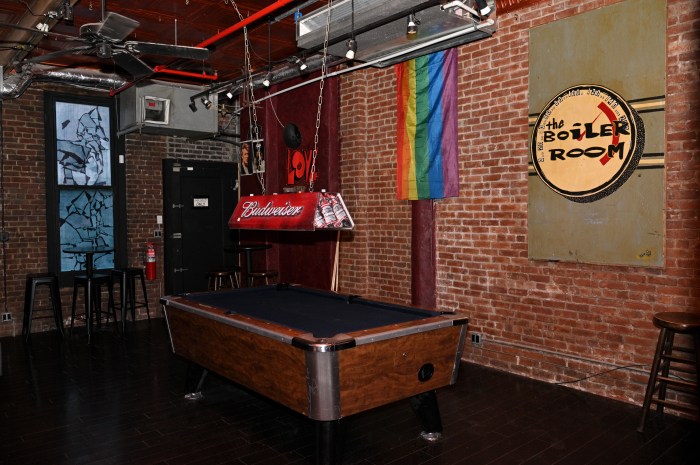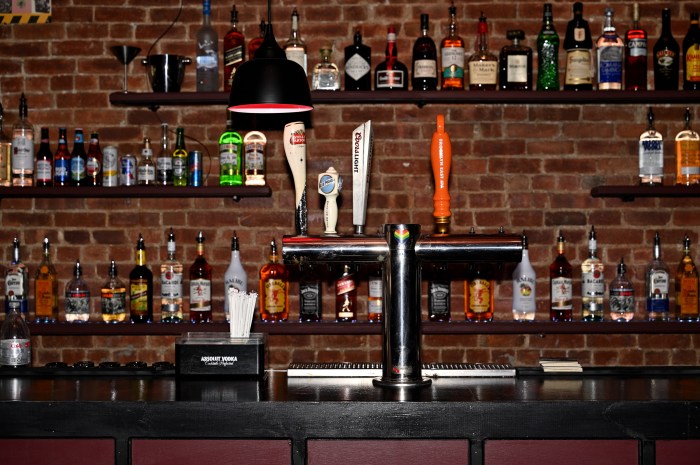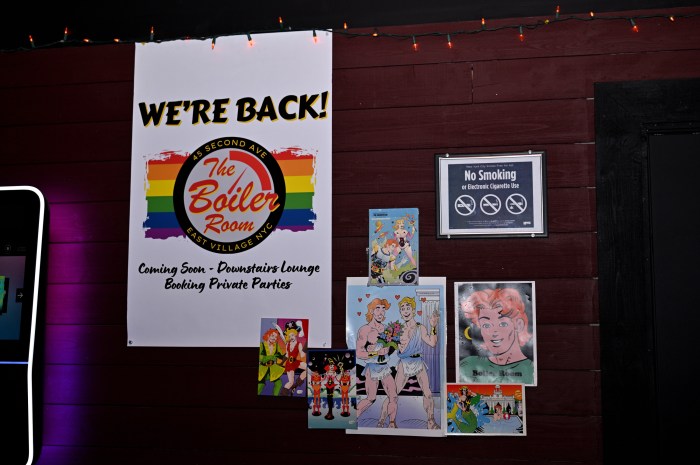
The Boiler Room’s new space is located at 45 Second Ave. in the East VIllage.
Donna Aceto
The Boiler Room, a dimly-lit queer neighborhood bar known for affordable drinks and a signature jukebox, has reopened in a new location just steps away from its old space in the East Village.
The 30-year-old no-frills, cash-only bar left its former location at 86 E. Fourth St. in April following issues with a landlord who started giving the owners headaches before the pandemic and continued to cause further problems in recent years, The Boiler Room’s owner, Gina Weinberg, told Gay City News in an interview.
“He wanted us out,” Weinberg said. “We had been in a battle with him, trying to stay there, working out the rent, but there was nothing we could do. There was no working it out with the landlord. So we had no choice. We decided to move on to a new venue.”
Weinberg and her family had little difficulty securing a new spot. They found an alternative location less than 500 feet away at 45 Second Ave., where the landlord “was begging for us to come in,” Weinberg said.
“It was nice to have somebody who actually wanted us to come in,” Weinberg said. “We worked with her and we were able to take the space.”
The Boiler Room is generally aiming to replicate the environment that drew loyal patrons for years at the old address. It is continuing its tradition of low drink prices — a banner on the bar’s website advertises $5 well drinks and Coors Light — and the brick wall interior features the same Budweiser-branded pool table next to the same setup of Rainbow Flags perched on the wall. A lit-up digital jukebox is attached to the wall near the end of the bar. Customers eager to return to their favorite bar have already started filing back in since the bar reopened its doors on Aug. 17.

A key difference, however, is that the new space has a basement. The owners are discussing how they plan to utilize it.
“We kind of kept with the same colors and stuff — and its a little bit newer,” Weinberg said. “It’s obviously a little different. Still, we hope we can use the basement and open everything up.”
The move to the new space was not all that difficult — it was just around the corner, after all — but there were some curveballs to navigate in the transition process. The liquor license, for example, was delayed because there was a church across the street. It turned out to be a defunct church that was ultimately demolished.
“We had to kind of prove it was gone,” Weinberg said.
The new location formerly served as a clothing store, Timbuktu — and that also presented unique challenges for staff members who were tasked with transforming it into a bar.
“That took us a little bit because it wasn’t an established eating or drinking place,” Weinberg explained. “We’re all good now.”

The local community helped usher in the next chapter of The Boiler Room’s journey. The community board, Weinberg said, “wanted us to stay” and individuals also attended the New York State Liquor Authority (SLA) meetings to vouch for the bar as it sought a liquor license for the new space.
“One guy stood at the SLA meeting the entire time, and at the end of it, he was in tears,” Weinberg said. “He said, ‘I had a problem on the street.’ Someone jumped him or whatever. He said, ‘I came into The Boiler Room. They helped me, you know, they wiped blood from my face and gave me something to drink. I don’t know what I would have done.’”

Messages like those kept Weinberg motivated to maintain the bar’s legacy into the future — even as things seemed uncertain during the pandemic and when the previous location shuttered.
“At one point,” Weinberg said, “I was like, ‘We’ve been in this for 30 years. Should I walk away?’ But then my kids want to take over. I was like, ‘We’re just going to keep going.’ And the neighborhood wanted it, so we decided to stay in the fight.”

